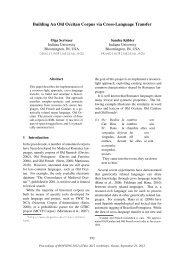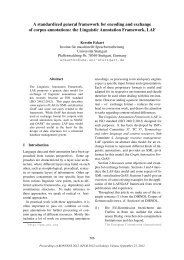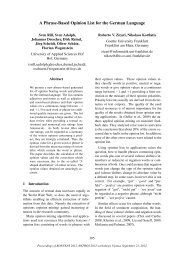Proceedings - Österreichische Gesellschaft für Artificial Intelligence
Proceedings - Österreichische Gesellschaft für Artificial Intelligence
Proceedings - Österreichische Gesellschaft für Artificial Intelligence
You also want an ePaper? Increase the reach of your titles
YUMPU automatically turns print PDFs into web optimized ePapers that Google loves.
Our tagset mixes and matches tags across finegrained<br />
tagsets – to achieve the following goals:<br />
- Give a fine-grained level of accurate linguistic<br />
description for the word POS and its semantic<br />
features of gender, number, person, aspect,<br />
voice, tense and mode.<br />
- Tag words that can be used – as in future work<br />
– as classification features for base-phrase<br />
chunkers and parsers. These words include<br />
function words such as interrogatives,<br />
complementizers, conditionals and the like.<br />
- Tag parts of speech that can be used – as in<br />
future work – as subjectivity and sentiment<br />
classification features like modals and<br />
negation among others.<br />
In appendix (A), we compare and contrast our<br />
tagset with that of ATB and RTS to facilitate<br />
comparing results with other taggers – if any – that<br />
are using different tagsets. Our tagset is a subset of<br />
ATB and is a superset of RTS.<br />
We add new tags to label Twitter-specific<br />
information and EA-specific grammatical categories<br />
like fixed expressions, existentials and aspectual<br />
progressives. Twitter-specific information requires<br />
tags for mentions(MNT), hashtags (HSH), emoticons<br />
(EMO), URLs (URL) and speech effects (LNG; for<br />
LeNGthened words) (e.g. اووووووي Awwwwwy (very)<br />
and xnyyyyyq (boring)).<br />
Approximately, 1% of our corpus is given our new<br />
tag EXP – for fixed expression. We define fixed<br />
expressions according to the following criteria:<br />
- They can be either unigram or multiword<br />
expressions;<br />
- Multiword fixed expressions are frozen in the<br />
sense that their individual words are not<br />
substitutable for synonyms. However, some of<br />
those expressions might have shorter versions;<br />
- Their meaning is not compositional and are<br />
rarely – if not never – used literally;<br />
- Their grammatical behavior does not match<br />
that of nouns, verbs, adjectives or adverbs. In<br />
other words, they cannot be head nouns or<br />
verbs in noun or verb phrases, respectively.<br />
They cannot modify nouns like adjectives or<br />
modify verbs like adverbs.<br />
- They are used for pragmatic purposes to show,<br />
ي for example, shock as in yAlhwy (Oh my<br />
goodness!), surprise as in yAHlwly<br />
ا (how interesting!) and frustration as in<br />
ك AlSbr mn Endk yArb (lit: patience رب<br />
is from you, Lord; gloss: Oh, Lord! Grant me<br />
patience) among other emotions.<br />
ي The unigram fixed expression yAlhwy (Oh<br />
my goodness) is diachronically composed of the<br />
vocative particle yA (oh), the noun lhw<br />
(goodness) and the possessive pronoun ي y (my).<br />
Yet, it cannot be decomposed into its parts and none<br />
of its parts can be substituted for a synonym. It<br />
functions only to show shock, anger, frustration<br />
emotions and the like. Meanwhile, its syntactic<br />
behavior does not fit in the paradigms of verbs,<br />
nouns, adjectives or adverbs.<br />
The same thing applies to the multiword fixed<br />
AlSbr mn Endk yArb ا ك رب expression<br />
(lit: patience is from you, Lord; gloss: Oh, Lord!<br />
Grant me patience). It is very rarely used literally as<br />
a prayer. As one expression, it does not<br />
grammatically behave like nouns, verbs, adjectives<br />
or adverbs. It is typically used as an expression of<br />
frustration or anger. Yet, it shows some degree of<br />
structural flexibility given that a shorter form exists<br />
yArb. AlSbr ا رب<br />
Two other tags that we use although they do not<br />
have equivalents in previous Arabic tagsets are: EX<br />
and PG for existentials and aspectual progressives,<br />
respectively. Unlike MSA, existentials in EA are not<br />
expressed by the deictic ھك hnAk (there) or the<br />
imperfect verb ywjd (exist). They are expressed<br />
by the preposition fy or fyh. Should these<br />
prepositions be used as existentials, they can<br />
syntactically map to a complete sentence such as <br />
!ا fyh mwAfqp (there is an agreement). Thus<br />
adding the EX tag to our tagset serves the purpose of<br />
facilitating phrase-boundary identification in later<br />
annotation layers for chunkers and parsers.<br />
Unlike MSA, EA has an aspectual progressive<br />
verb prefix ب b found in examples like ب&%$ byktb<br />
ب%! ل byfkr (he's thinking) and ب'& writing), (he's<br />
btqwl (she's saying). The aspectual progressive<br />
prefix is split off in tokenization and is tagged as PG.<br />
Another tag that we add is MD to tag modals and<br />
modal adjuncts – in both verbal and nominal forms.<br />
For example, both the modal verb &) ymkn (may)<br />
in *)%+ &) ymkn yjtmEw (they may meet) and the<br />
,وري Drwry (must) in ,وري modal adjective<br />
Drwry nrwH (we must go) are both tagged as .وح<br />
MD. MD is used to tag all modality types – epistemic,<br />
deontic and evidential.<br />
Some tagsets like RTS give simple, comparative<br />
and superlative adjectives one tag – JJ. ATB labels<br />
only simple and comparative adjectives, given that<br />
superlative adjectives are not morphologically<br />
marked. In our tagset, simple, comparative and<br />
41<br />
<strong>Proceedings</strong> of KONVENS 2012 (Main track: oral presentations), Vienna, September 19, 2012





